Christopher Marlowe also known as Kit Marlowe was an English poet, a playwright, and a translator of the Elizabethan times. Marlowe was born in 1564 in Canterbury, England and was the son of a shoemaker. Little is known about Marlowe’s real life as he died mysteriously at a very early age of 29. Born just two months apart, William Shakespeare was one of his followers and was greatly influenced by his literary works.
Marlowe was one of the most dramatic poets of his time. His writing style was famous for the use of blank verses and captured the pleasure and sufferings of love and at the same time was witty and cheerful.
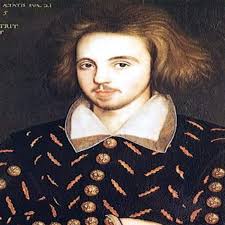
Christopher Marlowe Poems
Contents
The Passionate Shepherd To His Love
‘The Passionate Shepherd To His Love’ is one of the most enticing love poems written by Christopher Marlowe and was published in 1599.
In this pastoral poem, a young shepherd describes his heartfelt love and ardent desire to be with his mistress, presumably a city dweller. Overwhelmed with love, the shepherd boy wants to win the heart of his beloved at any cost. He wants to gift her with all the material objects that nature could provide him. He promises to make her a gown made of the finest wool and a belt of straw and ivy buds.
The shepherd boy asks his lady love to join him amidst the beauty of nature in the countryside where he would make her a bed of roses with a cap of flowers and kirtle embroidered with myrtle leaves with the Madrigals singing in the background.
Marlowe’s “Passionate Shepherd” is an interpretation of everlasting love, hope and the beauty of nature. The passionate love poem commemorates the joy and exuberance of young love, is delightful to read and is one of the most acknowledged poems of his time.
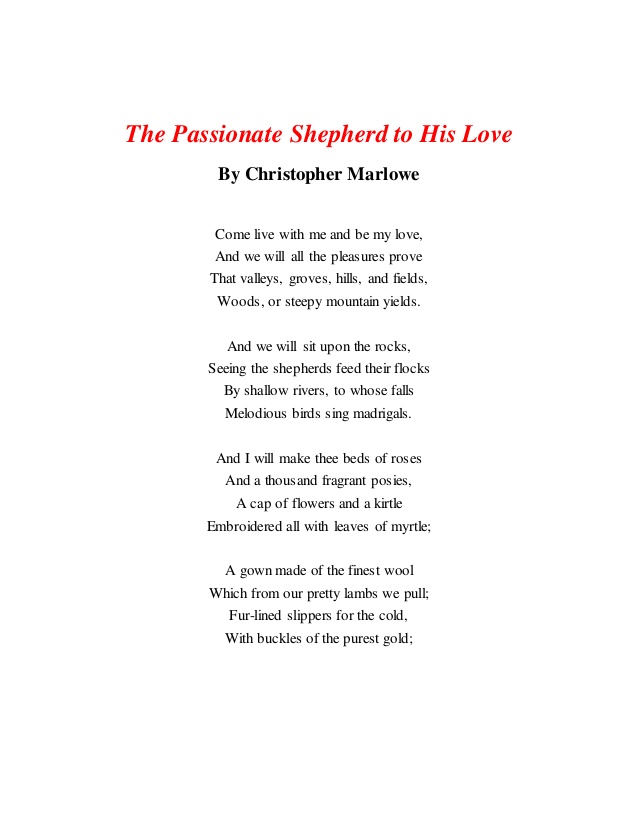
Download the free PDF file from here: The Passionate Shepherd
Who Ever Loved That Loved Not At First Sight?
‘Who Ever Loved That Loved Not at First Sight?’ is a small extract taken from Marlowe’s larger poem Hero and Leander.
In this poem, Marlowe once again emphasises how fate plays an important role in our lives and we are merely puppets in its hands.
The main protagonists of the poem Hero and Leander are brought together by fate and falls in love instantly. Both of the characters have been defined to be beautiful beyond God’s imagination.
Hero is as beautiful as Goddess Venus and even Cupid cannot resist her and falls in love with her at first sight. Marlowe’s description of Leander is somewhat unconventional. The poet describes Leander’s handsomeness to feminine beauty which was quite common in Renaissance times.
Hero who is a virgin priestess to the goddess Venus is vowed to keep her chastity intact. Struck by Cupid’s arrow, Hero falls in love with Leander but forbids to be united with Leander and returns to her tower.
Leander cannot bear the separation and jumps into the water of Abydos to swim back to the tower at Hellespont. Meanwhile, sea-god Neptune is besotted by Leander and captures him. Soon he realizes that Leander is indeed a mortal man and releases him. Leander swims back to Hero and finally, the duo is overcome with passion and consummate their love.
The poem is a beautiful rendition of passion and yearning for love. The poet describes the two lovers as ‘two gold ingots’ brought together by an act of fate.
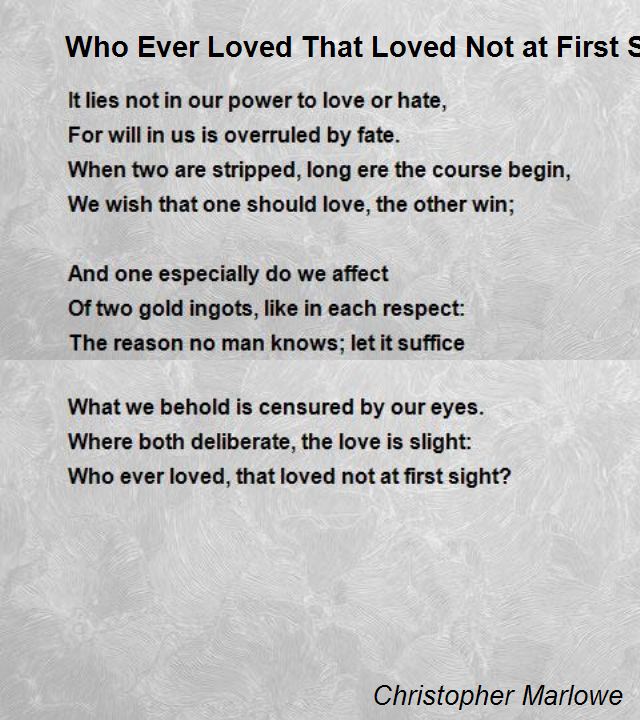
The free PDF version is available here: Whoever Loved That Loved Not At First Sight
The Face That Launch’d a Thousand Ships
“The Face That Launch’d a Thousand Ships” is an extract that appears in the famous play of “The Tragical History of Doctor Faustus” and is one of the most beautiful lines composed by Marlowe.
Doctor Faustus is at the verge of death as he has signed a deal with the devil and will be dragged to Hell. As a final wish, he requests the demon Mephistophilis to show him the spirit of Helen of Troy considered to be an epitome of beauty in ancient times. Marlowe here refers to Helen as a deadly and seductive beauty who has caused the Trojan war and has destroyed thousands of lives.
The poem suggests how Faustus even at the final moment of his death is lured by the material things and misses his only chance of true salvation. Doctor Faustus is attracted to the physical beauty of Helen rather than her soul and is driven by lust rather than love.
The poem relates how Faustus who has gained all knowledge and power is still superficially blinded by his pride and indignity and fails to accept the greater virtues of life.
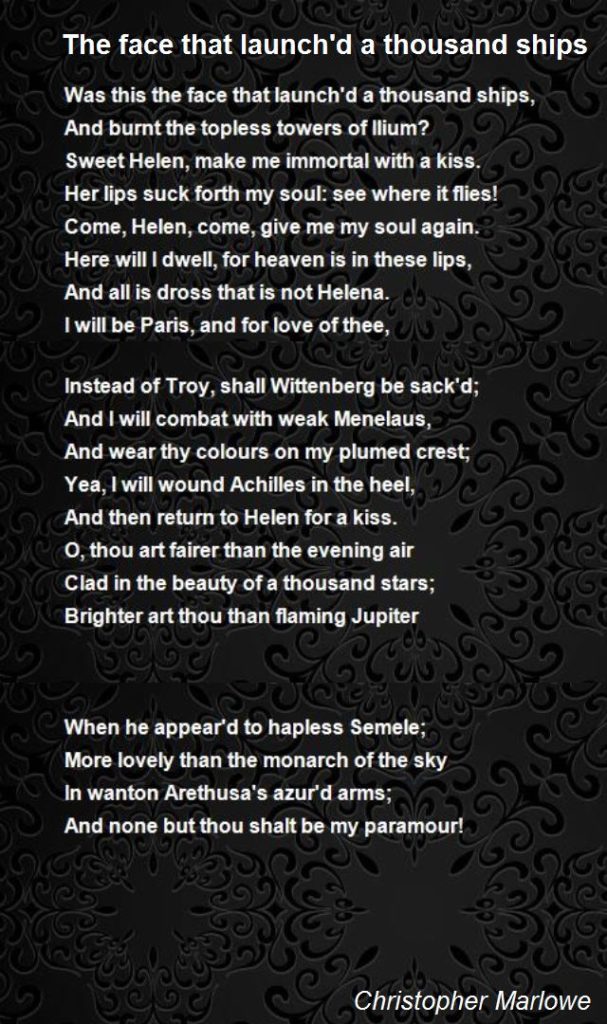
Click for the free pdf here: The Face that launched a thousand ships
Lament for Zenocrate
The ‘Lament for Zenocrate’ is part of one of Marlowe’s earliest plays Tamburlaine the Great. The poem speaks about Zenocrate the daughter of Sultan who is held captive by Tamburlaine and later becomes the Queen of Persia.
Zenocrate is described as a woman of ethereal beauty and great power who is worshipped by all. She is an empress not only by her marriage but is a true princess by birth. She protests against Tamburlaine for ordering death sentence against the virgins and also grieves over the suicide of Bajazeth and Zabina. Her beauty is so captivating that even supernatural beings like Seraphines could not resist her.
Marlowe’s portrayal of Zenocrate defies the normal interpretation of conventional Muslim woman.
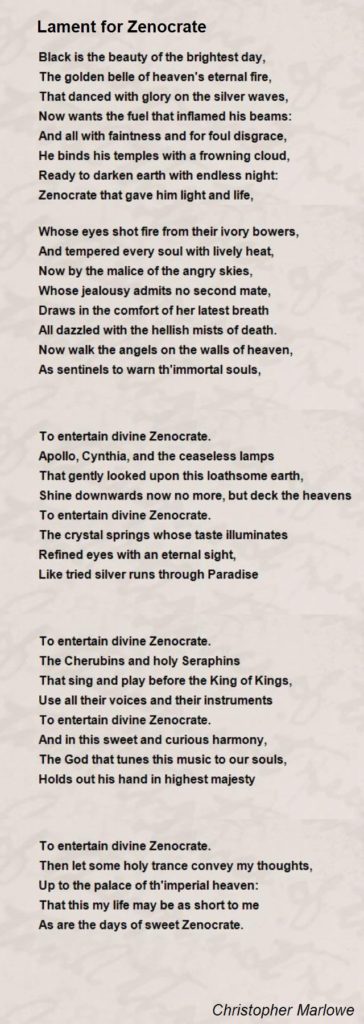
Click the link here: Lament of Zenocrate
Hero and Leander
Christopher Marlowe’s epic poem is based on Greek mythological characters Hero and Leander who are madly in love with each other. The poem is sensuous and erotic and also has a touch of a comic element to it.
Hero lights up her tower every day so that Leander can cross the river Abydos and swim back to her. One stormy night, Leander jumps into the river to reach his beloved but the strong winds blow off Hero’s light and Leander drowns into the darkness of the water. The next morning, Hero founds the lifeless body of Leander. Unable to bear the grief, she jumps from the top of her tower and gives up her life only to be reunited by death.
The full text of the poem Hero and Leander is available here: Hero and Leander
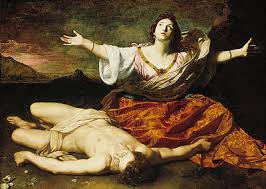
Check out some of Marlowe’s famous monologues
Famous Plays by Christopher Marlowe
The Inevitable Day Poem by Christopher Marlowe
The Massacre at Paris, Christopher Marlowe Summary
Enter A Spy, The Double Life of Christopher Marlowe
Christopher Marlowe Famous Quotes
Christopher Marlowe Vs William Shakespeare Comparison